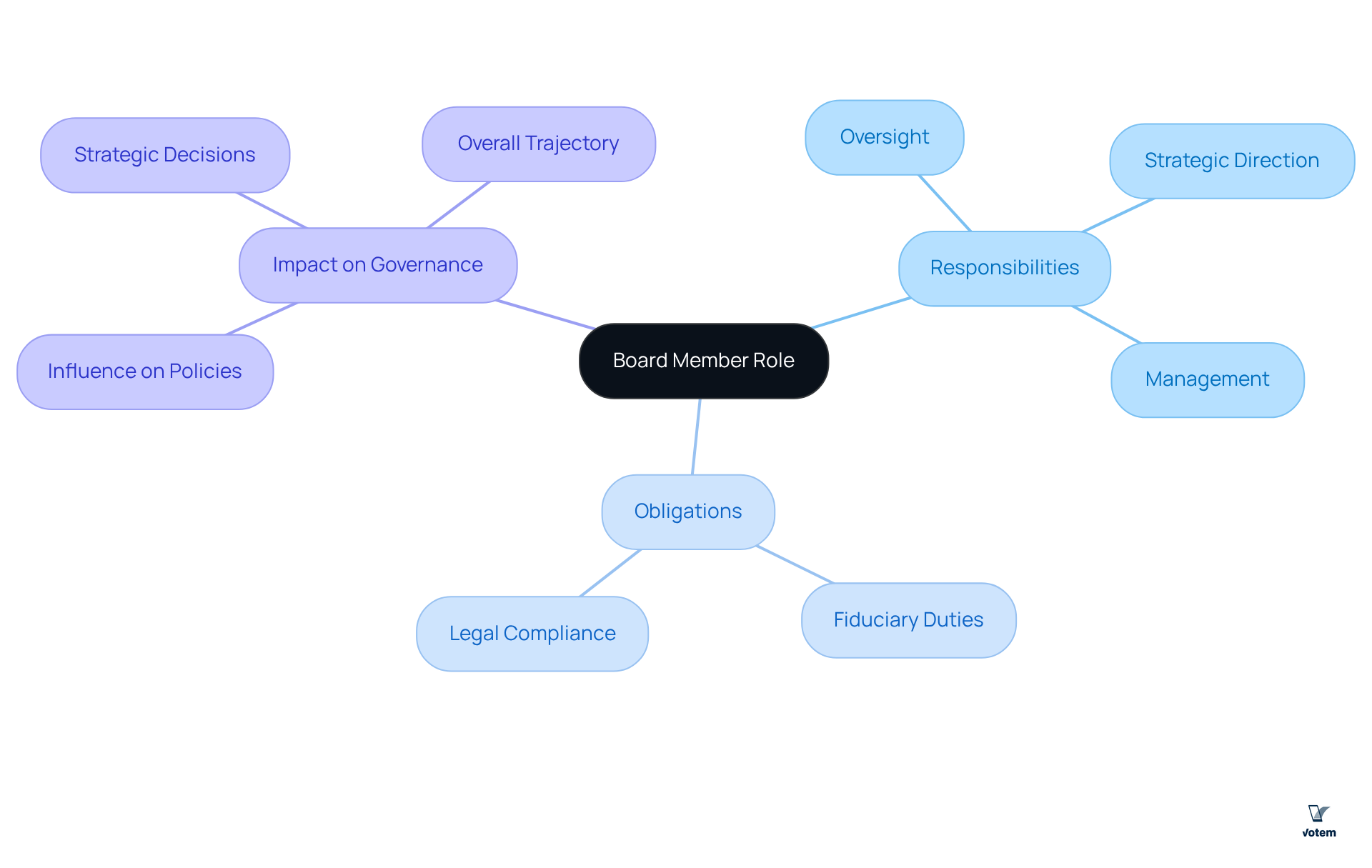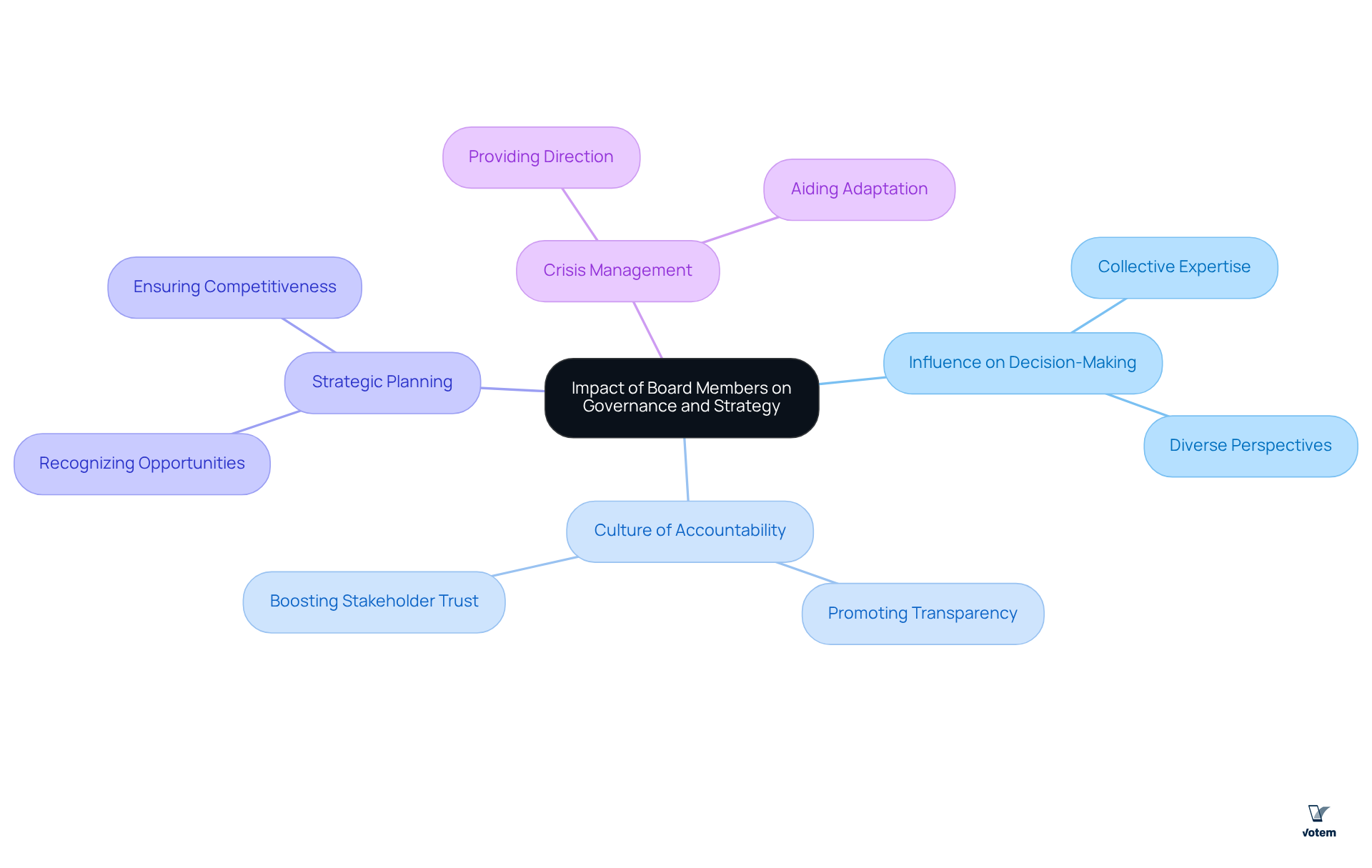Overview
The role of a board member in governance is pivotal; it involves providing oversight, strategic direction, and management to ensure that the entity fulfills its mission while adhering to legal and ethical standards. This responsibility is underscored by the emphasis on fiduciary duties, which include:
- Duty of care
- Duty of loyalty
- Duty of obedience
Collectively, these duties not only enhance organizational performance but also foster stakeholder trust. Furthermore, understanding these roles is essential for effective governance and leadership within the organization.
Introduction
A board member serves as a cornerstone of governance, wielding significant influence over an organization’s direction and integrity. Their multifaceted role encompasses oversight, strategic planning, and a steadfast commitment to ethical standards and fiduciary responsibilities. However, how can board members effectively navigate the complexities of governance to ensure their organizations not only survive but thrive in an ever-evolving landscape? Understanding the depth of their responsibilities and the impact they can have is crucial for fostering effective leadership and sustainable success. This understanding will not only enhance their governance capabilities but also empower them to drive their organizations toward a prosperous future.
Define Board Member: Role and Significance
A board member is a pivotal figure appointed to serve on the board of directors for a corporation, nonprofit, or governmental entity. Their primary responsibility encompasses oversight, strategic direction, and management, all aimed at ensuring the entity fulfills its mission while adhering to legal and ethical standards.
As fiduciaries, board representatives bear a legal obligation to act in the best interests of the entity and its stakeholders. This role is not merely functional; it significantly influences the entity’s policies, strategic decisions, and overall trajectory, underscoring the critical nature of a board member’s participation in .

Explore Board Member Responsibilities and Duties
Board members have several essential responsibilities that are crucial for effective governance.
- Duty of Care: Board members are expected to make informed decisions and act prudently in the organization’s best interests. This includes attending meetings, reviewing relevant materials, and actively participating in discussions. A case study on the vice-chair role illustrates how clear expectations can enhance board leadership and decision-making. Furthermore, the CastIron platform‘s ability to encrypt every ballot in transit and at rest using AES-256 encryption underscores the importance of security and compliance in governance.
- Duty of Loyalty: Board members must prioritize the interests of the entity above personal gains, actively avoiding conflicts of interest. This commitment fosters trust and integrity within the board.
- Duty of Obedience: Board members ensure the entity complies with applicable laws, regulations, and its governing documents. This duty is vital for maintaining compliance and safeguarding the entity’s mission.
- Strategic Direction: The board member plays a key role in setting the entity’s strategic direction and monitoring its implementation. Participating in conversations regarding the chief executive’s voting privileges can clarify governance frameworks and enhance organizational dynamics.
- Financial Oversight: Board members must ensure that the entity stays financially stable and that resources are used effectively for proper financial oversight. Understanding the is crucial for fulfilling these responsibilities.
- Advocacy: Frequently serving as representatives for the organization, board members promote its mission and obtain support from stakeholders. Their enthusiasm for the mission must be balanced with the duty of management.
Statistics suggest that a well-informed group can significantly improve organizational performance, with many teams struggling to differentiate between management and oversight. Notably, the CastIron platform can boost voter turnout by up to 3× on launch day, highlighting the impact of effective governance on engagement. By fulfilling these duties, directors not only uphold their fiduciary responsibilities but also contribute to the overall success and sustainability of the entity. As Barry S. Bader observes, directors function as custodians of the entity’s resources and must demonstrate due diligence and supervision to guarantee that the entity is well-managed and that its financial status remains stable.

Assess the Impact of Board Members on Governance and Strategy
A board member plays a crucial role in influencing governance and strategy within a company. Their collective expertise and diverse perspectives are paramount for informed decision-making, which is essential for navigating complex challenges. Effective groups promote a culture of accountability and transparency, boosting stakeholder trust and involvement.
Furthermore, committee participants significantly affect strategic planning by recognizing opportunities for expansion and creativity, ensuring that the entity remains competitive and aligned with its mission. For instance, during periods of crisis, a well-operating group can provide essential direction and assistance, aiding the entity in adapting and thriving.
Ultimately, the organization’s ability to achieve its goals and directly correlates with the effectiveness of its board members.

Conclusion
The role of a board member is integral to the governance and strategic direction of any organization. Board members are not only responsible for overseeing operations but also for ensuring that the entity adheres to its mission while upholding legal and ethical standards. Their influence extends beyond mere oversight; it shapes the policies and decisions that define the organization’s future.
Key responsibilities of board members include:
- The duty of care
- Loyalty
- Obedience
These collectively guide their actions in the best interest of the entity. By engaging in informed decision-making, providing financial oversight, and advocating for the organization, board members enhance governance effectiveness. Furthermore, their collective expertise fosters a culture of accountability and transparency, which is essential for building stakeholder trust and facilitating strategic growth.
In summary, the impact of board members on governance and strategy cannot be overstated. They serve as custodians of the organization’s resources and play a crucial role in navigating challenges and seizing opportunities. Recognizing the significance of their contributions is vital for any entity aiming to achieve its goals and fulfill its mission. Embracing the responsibilities of board membership not only strengthens governance but also ensures that the organization remains resilient and competitive in an ever-evolving landscape.
Frequently Asked Questions
What is the role of a board member?
A board member serves on the board of directors for a corporation, nonprofit, or governmental entity, with responsibilities that include oversight, strategic direction, and management to ensure the entity fulfills its mission while adhering to legal and ethical standards.
What are the legal obligations of a board member?
Board members have a fiduciary duty to act in the best interests of the entity and its stakeholders, which includes making decisions that align with the entity’s goals and maintaining ethical standards.
How do board members influence an entity?
Board members significantly influence the entity’s policies, strategic decisions, and overall trajectory, highlighting the importance of their role in effective governance.
List of Sources
- Define Board Member: Role and Significance
- Board Members and Personal Contributions (https://bridgespan.org/insights/board-members-personal-contributions)
- CASE STUDIES (https://academia.edu/42179191/CASE_STUDIES)
- seechangemanagement.com (https://seechangemanagement.com/case_studies/community)
- Explore Board Member Responsibilities and Duties
- Board Member Roles and Responsibilities | BoardSource (https://boardsource.org/fundamental-topics-of-nonprofit-board-service/roles-responsibilities)

